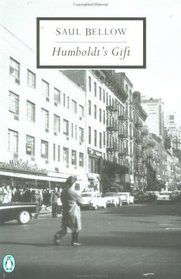Helpful Score: 2
Here's what the back cover says: "Never has Saul Bellow's unsurpassed genius for creating full-blooded characters been so penetrating, so charged with exuberant vitality, as in HUMBOLDT'S GIFT. Here Renata, all-woman and then some...Rinaldo, junior-league Mafioso tough...and Charlie, living legend with a frenzied past...live out destinies complicated by the unforgettable Humboldt. And Humboldt--drinker, lover, sometimes bum, and lifetime shadow of Charlie Citrine--plots a dubious revenge for services rendered in the name of friendship."
Here's what I say: I almost never put a book down, but I got as far as pg. 110 out of 471. The characters may be full-blooded in someone's mind, but not mine. They were cartoon caricatures at best. Sorry, Mr. Bellow, this one's not my cup of tea.
Here's what I say: I almost never put a book down, but I got as far as pg. 110 out of 471. The characters may be full-blooded in someone's mind, but not mine. They were cartoon caricatures at best. Sorry, Mr. Bellow, this one's not my cup of tea.
Helpful Score: 1
This was a tough read but well worth working through. Masterful prose!
As a novel, I only go three stars on this. It's OK, but it's just OK. I just couldn't get into it more than that. However, there are several passages where Bellow examines the nature of consciousness, of soul, and the difference between being and self-awareness - a topic that has long fascinated me and that he expresses well.
So anyway. The first two hundred pages I was all too aware I was reading 70's-era fiction - I don't know why but around page 100 I thought, "this is something Playboy would consider intellectual fiction." Then 30 pages later our protagonist ended up at the Playboy club. I found that significant. Once the novel moved away from Chicago, I think the last 250 pages made a much better short novel than the full 480-page novel is. Plus, all the stuff about the nature of existence is in there. Someone fix that up and let me know when it's ready.
So anyway. The first two hundred pages I was all too aware I was reading 70's-era fiction - I don't know why but around page 100 I thought, "this is something Playboy would consider intellectual fiction." Then 30 pages later our protagonist ended up at the Playboy club. I found that significant. Once the novel moved away from Chicago, I think the last 250 pages made a much better short novel than the full 480-page novel is. Plus, all the stuff about the nature of existence is in there. Someone fix that up and let me know when it's ready.
This should be a movie.




